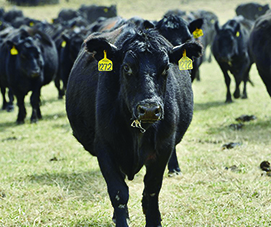Tell the USDA No on Mandatory Electronic Animal Identification

For decades, multinational meatpacking corporations, high-tech companies, and the USDA have pushed mandatory electronic identification for livestock, particularly cattle. They claim it’s an animal health measure, with veiled claims that it also supports food safety, but neither is true.
The real story is that it is to promote international trade, thus maximizing the meatpacking companies’ profits, while the high-tech companies will make millions selling tags, readers, and all the related infrastructure … all at the expense of farmers and ranchers.
The proposal for electronic ID was defeated in 2010 by massive opposition, from organic farmers, conventional ranchers, livestock sale barns, horse owners, homesteaders, and consumers who want to buy from American producers. But Agribusiness and its allies in the USDA are now trying to bring it back.
On January 18th, 2023, USDA published a proposed rule (Docket No. APHIS-2021-0020), “Use of Electronic Identification Eartags as Official Identification in Cattle and Bison.”
Mandatory electronic animal identification is a solution in search of a problem. The industry’s claims that it will help with animal health don’t hold water because the current, low-tech methods are working effectively. And it doesn’t do anything at all for food safety, since the tracking ends at the slaughterhouse.
The real reason for mandatory electronic animal identification is to satisfy monopolistic meatpacker interests to increase their exports markets, their profits, and their control of the U.S. cattle industry.
Mandatory electronic animal identification is a step in the wrong direction, especially at a time when the negative impacts of corporate consolidation of our food supply are becoming ever clearer, with shortages and skyrocketing prices (while the corporations’ profits also skyrocket).
Here are just some of the problems:
- Mandatory electronic livestock identification unfairly burdens independent family farm livestock producers & taxpayers. It’s not only the costs of the electronic tags themselves, but all the related infrastructure, particularly the readers and software. The rapid changes in technology also mean that readers may need to be replaced frequently, creating endless future costs.
- The proposal favors corporate-controlled operations in which the company owns the animals from birth to death, because they are allowed to use “Group/lot identification,” i.e. simply designating the group of thousands of animals with an ID number instead of electronically tagging each animal. Since independent livestock producers are required to tag each animal, the program creates a huge advantage for vertically integrated, corporate agri-business and meatpackers! This drives consolidation of our food system further, making it difficult, if not impossible, for small and mid-sized livestock producers to survive.
- Mandatory electronic livestock identification creates no food safety benefit and will not prevent foodborne illnesses because the tracking ends at the time of slaughter. The vast majority of food safety issues stem from slaughter and processing, not the farm. This proposal takes the safety focus off of where the problems have occurred (the massive processing plants), a diversionary tactic from the real reforms that are needed for food safety, such as improved oversight of slaughterhouses and food processing facilities, and increased inspections of imported foods.
- Programs such as mandatory electronic animal identification that burden independent livestock farmers and ranchers will hurt efforts to develop safer, decentralized food systems.
- Mandatory electronic livestock identification is not a proven effective tool for disease prevention. USDA has been very successful in eradicating diseases through existing, time-proven, low-tech programs. USDA should not be allowed to supplant these successful programs with an unproven system that will consume massive resources in administration and bureaucracy, rather than focusing on the prevention of disease.
- Mandatory electronic livestock identification creates privacy concerns and increases corporate control over the livestock industry. Mandatory electronic animal identification could create potential risks for farmers’ private financial information and fuel increased corporate control over the livestock industry by giving packers more information about how animals are produced. This information could potentially be used to discriminate against farmers based on the information available.
The USDA is taking comments on its proposal until March 20! Submit your comments here.